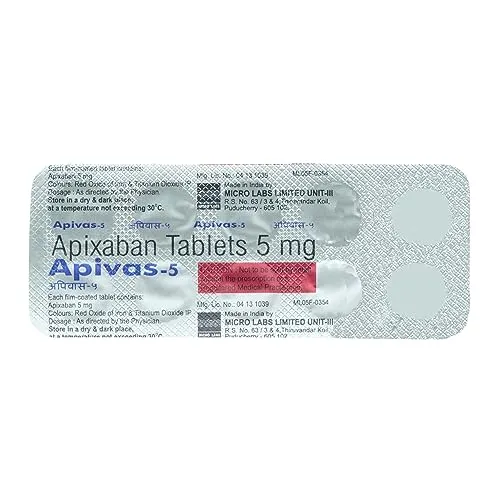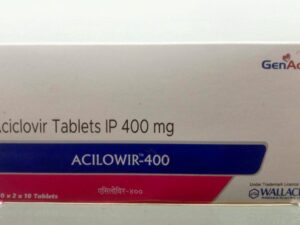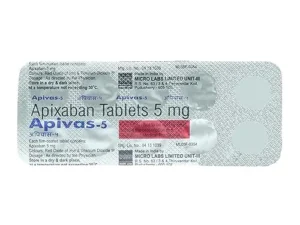Apivas 5 Tablet is a prescription anticoagulant medicine used to prevent and treat blood clots in conditions such as deep vein thrombosis (DVT) and pulmonary embolism (PE). It also reduces the risk of stroke and systemic embolism in patients with non-valvular atrial fibrillation, a condition where the heart beats irregularly and increases the risk of clot formation. The active ingredient, Apixaban, is classified as a direct Factor Xa inhibitor, which means it directly blocks one of the key enzymes involved in the blood clotting process. By doing so, it helps maintain smooth blood flow and lowers the risk of clot-related complications such as strokes, heart attacks, or blocked arteries in the lungs or legs. Apivas 5 Tablet offers a predictable anticoagulant effect and does not require routine blood monitoring, which makes it a convenient long-term treatment option for eligible patients.
 Uses
Uses
- Prevention of Stroke and Systemic Embolism
Benefits of Apivas 5 Tablet
- Prevents stroke and systemic embolism in patients with atrial fibrillation (non-valvular)
- Treats and prevents deep vein thrombosis (DVT), particularly in leg veins
- Reduces risk of pulmonary embolism (PE) by stopping clots from blocking lung arteries
- Prevents blood clots after hip or knee replacement surgery, reducing post-surgical complications
- Offers fixed-dose anticoagulation without regular INR monitoring, improving patient adherence
 How Apivas 5 Tablet works
How Apivas 5 Tablet works
Apivas-5 Tablet contains Apixaban, which blocks Factor Xa, an enzyme needed to form clots. Normally, Factor Xa helps produce thrombin, which is responsible for making fibrin—the main component of clots. By blocking this enzyme, Apixaban lowers the amount of thrombin and stops clots from forming. It also prevents existing clots from getting larger. This targeted action improves blood flow and reduces the risk of complications like stroke, heart attack, or blocked lung arteries. The effect is reliable and does not require frequent dose changes or blood tests.
 Side effects
Side effects
- Anemia
- Bleeding from gums, nose, or wounds
- Nausea
- Low blood pressure
- Bruising or swelling
- Wound discharge
- Localized bleeding under the skin






